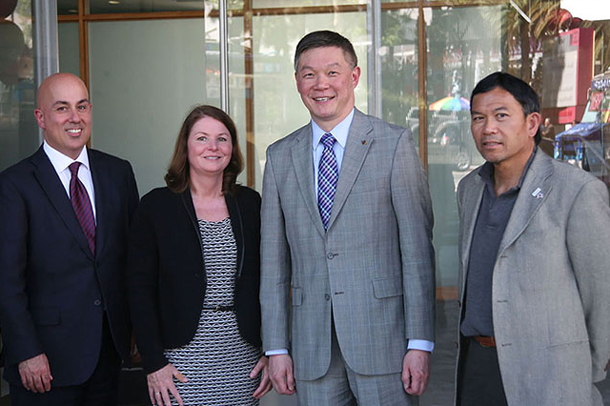Fresh from a meeting with President Barack Obama at the White House, American Medical Association President Robert Wah, MD, stopped by Keck Medical Center of USC to discuss the Affordable Care Act, regulatory hurdles facing physicians and historic legislation that could impact health care payments.
“The cost of health care in this country is rising in a way that we as a society are having trouble keeping up with,” said Wah, who became AMA president in June 2014 and is the first Asian-American to hold the post. “The path we are on is not sustainable.”
Stephanie Hall, MD, chief medical officer of Keck Medical Center of USC hosted the March 26 presentation. Wah, a reproductive endocrinologist and obstetrician-gynecologist, was joined at the Broad Conference Center by Pedram Salimpour, MD, president of the Los Angeles County Medical Association.
Wah met with Obama the day before his USC visit to discuss legislation that could directly affect physicians and patients. The Medicare Access and CHIP Reauthorization Act of 2015 will improve Medicare payments for physician services, expand availability of Medicare data, encourage care management for patients with chronic care needs and extend the Children’s Health Insurance Program for two more years.
“We’re talking to the executive and legislative branches about the regulatory tsunami facing physicians and their offices,” Wah said.
The Senate is expected to vote on changes to Medicare in April, but not before a 21 percent cut in payments to physicians kicks in. The bill would prevent those cuts.
Wah urged physicians to contact lawmakers to lobby for the bill’s passage.
“Send them emails, send them tweets, send them smoke signals — whatever you need to do to send them the message that this needs to get done,” said Wah, who practices and teaches at the Walter Reed National Military Medical Center and the National Institutes of Health in Bethesda, MD.
Wah also discussed strategic goals and recent AMA initiatives aimed at improving medical education, health outcomes for patients and professional practice satisfaction. He encouraged physicians to become involved with the AMA, the largest association of physicians and medical students in the United States.
“We serve as an amplifier for the voice of individual physicians,” Wah said. “There are a lot of forces aligned against physicians. We need to work together to not get rolled.”
— Douglas Morino


